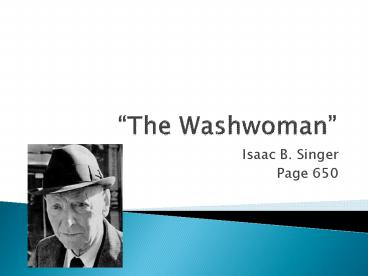- PowerPoint PPT Presentation
1 / 7
Title:
Description:
Isaac B. Singer Page 650 Born in Poland Jewish (wrote in Yiddish language of some Eastern European Jews and their descendants) Short stories, novels, and essays ... – PowerPoint PPT presentation
Number of Views:12
Avg rating:3.0/5.0
Title:
1
The Washwoman
- Isaac B. Singer
- Page 650
2
Isaac B. Singer (1904-1991)
- Born in Poland
- Jewish (wrote in Yiddishlanguage of some Eastern
European Jews and their descendants) - Short stories, novels, and essays that capture
the lessons of everyday life - Won the Nobel Prize for Literature in 1978
3
Before You Read
- The media often show the elderly in unrealistic
or unflattering ways. - List 3 examples of older characters in movies or
on TV shows, or commercials - What are some positive contributions that the
elderly make to our society?
4
Vocabulary
- Gentiles any persons not Jewish in this case,
specifically Christians - groschen Austrian cent or penny (this section of
Poland ruled by Austria in the early 1900s) - rancor deep hatred or bitter hate
- obstinacy stubbornness
5
Some things to look for
- What type of essay is The Washwoman?
- What is it about the Washwoman that Isaac Singer
admired most? - What does the Washwoman stand for (what do her
hands represent)? - How do we know that Singer and his mother are
concerned about the Washwoman? - What passage conveys Singers feeling that the
Washwoman was an extraordinary person and
deserves to be rewarded for all of her hard work
and dedication?
6
Notes
- What type of essay is The Washwoman?
- narrative essay
- What is it about the Washwoman that Isaac Singer
admired most? - her strength and dedication to her work
- What does the Washwoman stand for (what do her
hands represent)? - Author believes that it is human nature to strive
to overcome obstacles her hands represent this
stubbornness (653)
7
Notes (cont)
- How do we know that Singer and his mother are
concerned about the Washwoman? - We mourned, both for the laundry and for the
old, toil-worn washwoman who had grown close to
us through the years she served us so faithfully
(654). - What passage conveys Singers feeling that the
Washwoman was an extraordinary person and
deserves to be rewarded for all of her hard work
and dedication? - I cannot imagine paradise without this Gentile
washwoman. I cannot even conceive of a world
where there is no recompense for such effort
(655).































